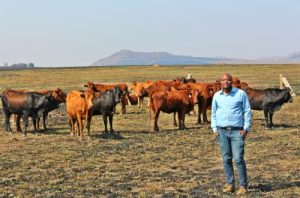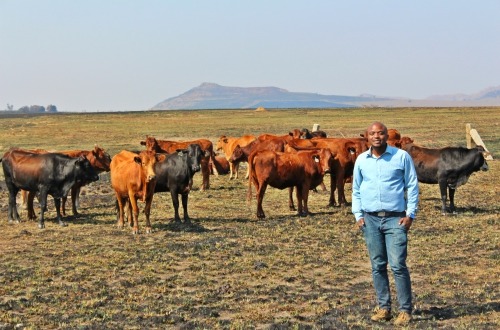
Serial entrepreneur and qualified electro-mechanical engineer, Ntuthuko Shezi, is hoping to elevate the cow as an asset and in so doing tap into the dormant commercial value inherent in, what he says, is Africa’s 100 million cattle.
In October 2015 Shezi launched Livestock Wealth, a startup that marries technology and Africa’s oldest and most enduring traditional form of wealth – cattle.
Calling it the traditional African ‘asset class’, the crowd-farming platform introduced the cow as an investment asset class in which consumers are able to own cattle regardless of where they are or their expertise in cattle or farming.
Bringing the masses into the mainstream
Shezi says he wanted to make investing more accessible to the average South African by investing in cows rather than unit trust and shares. “The stock market is complicated, cows are easy – that’s the reason we decided to start Livestock Wealth in the first place,” says Shezi.
Despite the many statistics saying how badly African people are at saving, says Shezi, people do have money to save.
“The existence of stokvels where billions are banked annually is proof that people actually do want to save. But what we do find is that the products that are there currently in the market do not appeal to the people. So people will put their money on something that appeals to them and that appeal is largely a factor of how easy it is to understand and how much of a grasp of the risks does a person have. So essentially in South Africa people invest around R50 billion in stokvels and funeral policies because they understand it and they don’t invest in shares, they don’t invest in bonds, they don’t invest in unit trusts because they are complicated.”
“So then we said let’s work with something that people understand, which is cows,” he says.
IMAGE SUPPLIED
The Livestock Wealth App and Website.
Investing in cows made easy
Cows are very easy to understand, Shezi says and adds that “If you own a cow you know that this is my cow and every year it gives birth. And the offspring is my income because I sell the offspring once a year.”
Shezi says investors will pay R10 500 for a cow as well as a R295 monthly fee that is used to look after the cow.
“We also have a monthly debit order functionality where you can buy your cow over a three-year period and you pay about R420 a month towards your cow,” he says
Potential investors can scroll through and purchase from available cows online through their website or mobile application. Thereafter Livestock Wealth will manage the cattle like an investment portfolio.
Livestock Wealth estimates that around 90% of the cows will deliver sellable calves every year. In order to pool the 10% loss of the income, Shezi says the income from the sale of all the calves to abattoirs, is split equally between all the investors.
According to the Livestock Wealth website, your cow’s offspring will be ready for sale in the beef market when it is six to seven months old and weighing approximately 220kg. At today’s rate, it will sell for R20/kg, earning R4400 before VAT, minus the 10% loss which is shared by everyone. With VAT added this comes to R4 514 per weaner calve.
Taking into account the R3 540 in annual fees – an investor would be looking at an annual return on investment of 9.28%, for the R10 500 purchase price for a single cow.
LISTEN: Ntuthuko Shezi explains the concept of the cow as an investment
Targeting the new investor
Livestock Wealth is aimed at two types of people, Shezi says. “We are targeting an individual who finds the stock market complicated but who really wants to invest, who’s got an affinity for cows and who likes cows as a manner of investment. The second person is also the person who likes cows as a method of creating and storing wealth, but who wants to save up for something. We are targeting guys who are saving up for lobola or a wedding, for example” he explains.
LISTEN: Shezi explains how the value of a cow is evaluated
Educating the market
Ensuring that the market understands what Livestock Wealth is about and how the investment process functions was a key focus for Shezi. He says educating the market on how cows reproduce and how it makes money has been very important.
“We don’t want anyone to invest without having understood what we are doing. I would rather spend a full day explaining to customers what we do before they buy. We cannot emphasize the education element enough.”
Shezi says, however, the challenge they have encountered with this is the speed and reach with which they can spread their message.
He says, “We are trying to do as much education on the website. We are doing a lot more on YouTube. We are also doing more of the town hall type meetings where we have people come and we tell them about what we do. The more we can educate the people and the more we can get them to understand the ins-and-outs of how this thing works – how many months does it take for a cow to get pregnant, what causes it to get pregnant, what causes it not to get pregnant, what are the risks because those are the questions people ask. The educated customer who really knows what is going on is your best customer because tomorrow he’s going to tell his friends and then his friends will be customers as well.”
LISTEN: The role that technology plays in the success of Livestock Wealth
Funding – Keeping it simple
Shezi says in the business’ startup phase, they had to focus on two things, “To start off with I’ve had to put in a little bit of my own cash to get off the ground. It’s always important for entrepreneurs to start with what you have. And also at the same time to keep things as simple and as uncomplicated as possible. We got a very simple basic website that got us going to where we could. We started with a few cows, we started with 40. Then we went out to prove the concept that it works and only then we can confidently go out there and say this is what we’ve done with our own money and this is how the customer/market has responded – can you help fund us for the next 100 or 1 000 cows?”
Livestock Wealth also participated in pitch competitions. “That is a good way to test your idea against other ideas out there. Most of the time when you win something, that money is largely ‘no-strings-attached’. We’ve been fortunate to receive some funding from The Innovation Hub, Alpha Code and Merrill Lynch,” he adds.






